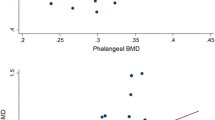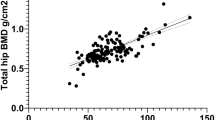Abstract
We investigated the relationship between calcaneal and axial bone mineral density in an elderly female population. We also investigated the influence of changing the reference populations on T-score values. Bone mineral density (BMD) was determined in 388 women (mean age 73 years) participating in a cross-sectional study. BMD values were determined at the left hip and the lumbar spine, L1–L4, using Hologic QDR 4500 equipment for dual X-ray absorptiometry (DXA). The calcaneal measurements were made with DEXA-T, a device using a dual X-ray and laser (DXL) technique that combines DXA measurement with measurement of the heel thickness using a laser reflection technique. DEXA-T is an older version of the Calscan DXL device now commercially available. T-score values were calculated for hip measurements with both the original reference population of the Hologic device and the NHANES III reference population. T scores for heel measurements were calculated with the original reference population of the peripheral device and the Calscan database, a new calcaneal reference population. Changing the reference populations had a great influence on both the heel and the hip T scores, especially those of the femoral neck where the percentage of subjects identified as osteoporotic decreased from 53% to 23%. We conclude that, with the NHANES III and the larger Calscan database, using the cut-off point of −2.5 SD, the heel measurements had optimal accuracy for detecting osteoporosis at either the combination of the lumbar spine and the femoral neck or the combination of the lumbar spine, the femoral neck, the total hip and the trochanter. BMD measurements of the calcaneus with DXL correlated fairly well with measurements at axial sites at the group level, while in individual subjects large deviations were observed between all the measured sites. We also conclude that the influence of the reference populations on the T scores is substantial when different DXA methods are being compared; the total number of subjects classified as osteoporotic varied from 7% to 53% between the sites and with different reference populations.




Similar content being viewed by others
References
Johnell O, Gullberg B, Allander E, Kanis JA (1992) The apparent incidence of hip fracture in Europe: a study of national register sources. MEDOS Study Group. Osteoporos Int 2:298–302
Kanis JA, Johnell O, De Laet C, Jonsson B, Oden A, Ogelsby AK (2002) International variations in hip fracture probabilities: implications for risk assessment. J Bone Miner Res 17:1237–1244
Cummings SR, Black DM, Nevitt MC, Browner W, Cauley J, Ensrud K, Genant HK, Palermo L, Scott J, Vogt TM (1993) Bone density at various sites for prediction of hip fractures. The Study of Osteoporotic Fractures Research Group. Lancet 341:72–75
Cheng S, Suominen H, Sakari-Rantala R, Laukkanen P, Avikainen V, Heikkinen E (1997) Calcaneal bone mineral density predicts fracture occurrence: a five- year follow-up study in elderly people. J Bone Miner Res 12:1075–1082
Siris ES, Miller PD, Barrett-Connor E, Faulkner KG, Wehren LE, Abbott TA, Berger ML, Santora AC, Sherwood LM (2001) Identification and fracture outcomes of undiagnosed low bone mineral density in postmenopausal women: results from the National Osteoporosis Risk Assessment. JAMA 286:2815–2822
Marshall D, Johnell O, Wedel H (1996) Meta-analysis of how well measures of bone mineral density predict occurrence of osteoporotic fractures. BMJ 312:1254–1259
Cummings SR, Bates D, Black DM (2002) Clinical use of bone densitometry: scientific review. JAMA 288:1889–1897
Wasnich RD, Ross PD, Heilbrun LK, Vogel JM (1987) Selection of the optimal skeletal site for fracture risk prediction. Clin Orthop 216:262–269
Swanpalmer J, Kullenberg R (2000) A new measuring device for quantifying the amount of mineral in the heel bone. Ann N Y Acad Sci 904:115–117
Bolotin HH, Sievanen H, Grashuis JL, Kuiper JW, Jarvinen TL (2001) Inaccuracies inherent in patient-specific dual-energy X-ray absorptiometry bone mineral density measurements: comprehensive phantom-based evaluation. J Bone Miner Res 16:417–426
Hakulinen MA, Saarakkala S, Toyras J, Kroger H, Jurvelin JS (2003) Dual energy X-ray laser measurement of calcaneal bone mineral density. Phys Med Biol 48:1741–1752
Diessel E, Fuerst T, Njeh CF, Hans D, Cheng S, Genant HK (2000) Comparison of an imaging heel quantitative ultrasound device (DTU-one) with densitometric and ultrasonic measurements. Br J Radiol 73:23–30
Fordham JN, Chinn DJ, Kumar N (2000) Identification of women with reduced bone density at the lumbar spine and femoral neck using BMD at the os calcis. Osteoporos Int 11:797–802
Langton CM, Langton DK (2000) Comparison of bone mineral density and quantitative ultrasound of the calcaneus: site-matched correlation and discrimination of axial BMD status. Br J Radiol 73:31–35
Sweeney AT, Malabanan AO, Blake MA, Weinberg J, Turner A, Ray P, Holick MF (2002) Bone mineral density assessment: comparison of dual-energy X-ray absorptiometry measurements at the calcaneus, spine, and hip. J Clin Densitom 5:57–62
Kullenberg R (2003) Reference database for dual X-ray and laser Calscan bone densitometer. J Clin Densitom 6:367–371
Looker AC, Wahner HW, Dunn WL, Calvo MS, Harris TB, Heyse SP, Johnston CC Jr, Lindsay RL (1995) Proximal femur bone mineral levels of US adults. Osteoporos Int 5:389–409
Chen Z, Maricic M, Lund P, Tesser J, Gluck O (1998) How the new Hologic hip normal reference values affect the densitometric diagnosis of osteoporosis. Osteoporos Int 8:423–427
Löfman O, Larsson L, Ross I, Toss G, Berglund K (1997) Bone mineral density in normal Swedish women. Bone 20:167–174
World Health Organization (1994) Assessment of fracture risk and its application to screening for postmenopausal osteoporosis. WHO, Geneva
Gluer CC, Blake G, Lu Y, Blunt BA, Jergas M, Genant HK (1995) Accurate assessment of precision errors: how to measure the reproducibility of bone densitometry techniques. Osteoporos Int 5:262–270
Williams ED, Daymond TJ (2003) Evaluation of calcaneus bone densitometry against hip and spine for diagnosis of osteoporosis. Br J Radiol 76:123–128
Kullenberg R, Falch JA (2003) Prevalence of osteoporosis using bone mineral measurements at the calcaneus by dual X-ray and laser (DXL). Osteoporos Int 14:823–827
Faulkner KG, von Stetten E, Miller P (1999) Discordance in patient classification using T-scores. J Clin Densitom 2:343–350
Kanis JA, Johnell O, Oden A, De Laet C, Oglesby A, Jonsson B (2002) Intervention thresholds for osteoporosis. Bone 31:26–31
Miller PD, Njeh, Jankowski LG, Lenchik L (2002) What are the standards by which bone mass measurement at peripheral skeletal sites should be used in the diagnosis of osteoporosis? J Clin Densitom [5 Suppl]:S39–45
Kanis JA, Gluer CC (2000) An update on the diagnosis and assessment of osteoporosis with densitometry. Committee of Scientific Advisors, International Osteoporosis Foundation. Osteoporos Int 11:192–202
Acknowledgements
This study was supported by a grant from Stockholm County Council.
Author information
Authors and Affiliations
Corresponding author
Rights and permissions
About this article
Cite this article
Salminen, H., Sääf, M., Ringertz, H. et al. Bone mineral density measurement in the calcaneus with DXL: comparison with hip and spine measurements in a cross-sectional study of an elderly female population. Osteoporos Int 16, 541–551 (2005). https://doi.org/10.1007/s00198-004-1719-x
Received:
Accepted:
Published:
Issue Date:
DOI: https://doi.org/10.1007/s00198-004-1719-x




